

CRANACH DIGITAL ARCHIVE. MIT Mints a Valuable New Form of Academic Currency - Commentary. By Kevin Carey The Massachusetts Institute of Technology has invented or improved many world-changing things—radar, information theory, and synthetic self-replicating molecules, to name a few.
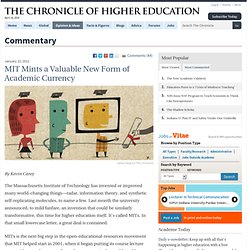
Last month the university announced, to mild fanfare, an invention that could be similarly transformative, this time for higher education itself. It's called MITx. In that small lowercase letter, a great deal is contained. MITx is the next big step in the open-educational-resources movement that MIT helped start in 2001, when it began putting its course lecture notes, videos, and exams online, where anyone in the world could use them at no cost. Meanwhile, the university experimented with using online tools to help improve the learning experience for its own students in Cambridge, Mass.
In doing this, MIT has cracked one of the fundamental problems retarding the growth of free online higher education as a force for human progress. MIT is particularly well suited to manage that dilemma. Open Access Map. Citations - Depending on the type of web based material, there are different ways to cite.
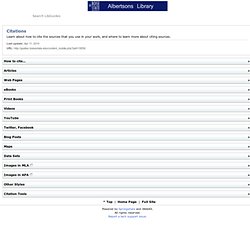
See below for citing a nonperiodical web page. You may use the MLA Handbook for Writers of Research Papers to see all the different ways to cite different web materials (Section 5.6). OWL at Purdue has also created this guide to MLA's web citations: If you would like to cite a web site, you will need to include similar information to citing a book: author, publisher, web page title, version, date of publication, date of access, and medium -- in this case Web is the medium. Academia.edu – $4.5M in Funding, 3M Unique Monthly Visitors – Can They Change Science Publication? Don’t call it “Facebook for Scientists” – it’s not about socializing, it’s about knowledge.
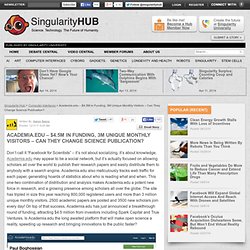
Academia.edu may appear to be a social network, but it’s actually focused on allowing scholars all over the world to publish their research papers and easily distribute them to anybody with a search engine. Academia.edu also meticulously tracks web traffic for each paper, generating hoards of statistics about who is reading what and when. This one-two combination of distribution and analysis makes Academia.edu a potent new force in research, and a growing presence among scholars all over the globe.
The site has tripled in size this year reaching 800,000 registered users and more than 3 million unique monthly visitors. 2500 academic papers are posted and 3500 new scholars join every day! On top of that success, Academia.edu has just announced a breakthrough round of funding, attracting $4.5 million from investors including Spark Capital and True Ventures. Academia.edu helps change that. Wittgenstein Source - Home. Ma lecture de l’Etude OCLC sur les métadonnées sociales [Volet 1]
Living Books About Life Home. Comparison of an Open Access University Press with Traditional Presses. * Article: Rory McGreal and Nian-Shing Chen, AUPress: A Comparison of an Open Access University Press with Traditional Presses.
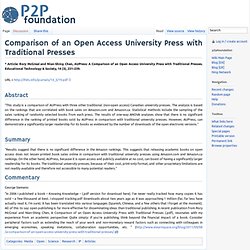
Educational Technology & Society, 14 (3), 231–239. URL = "This study is a comparison of AUPress with three other traditional (non-open access) Canadian university presses. The analysis is based on the rankings that are correlated with book sales on Amazon.com and Amazon.ca. Statistical methods include the sampling of the sales ranking of randomly selected books from each press.
"Results suggest that there is no significant difference in the Amazon rankings. Digital Humanities Summer Institute. Lodel. SearchPigeon.org - Online Journals and Research Tools. Living Books About Life Home. Les réseaux sociaux scientifiques sur Internet : compte-rendu d’une courte étude. Afin de s’orienter dans ses développements, [VertigO] a effectué entre 2009 et 2010 une recherche préliminaire sur la question des réseaux sociaux scientifiques numériques (pour des détails voir Cette recherche visait aussi à voir comment le développement d’une telle plateforme serait perçu par des chercheurs et intervenants en activité dans un domaine de recherche/intervention multidisciplinaire.
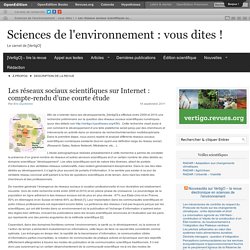
Dans le première étape, nous avons repéré et analysé différents réseaux sociaux scientifiques numériques existants (tout en ayant une définition large du réseau social) (Research Gates, Nature Network, Médiaterre, etc…). Shanda Entertainment: Shanda Interactive Entertainment Limited - Overview. DC Books: Online Publisher of Malayalam Books, Translations, Original Works. Apparel, Books, Cameras, Watches, Mobiles. Paperight. Yoza Project. L'édition numérique dans les pays en développement. E-books, impression à la demande, sites de vente en ligne, essor des téléphones portables… les nouvelles technologies transforment profondément le mode de circulation des textes.
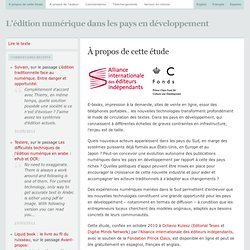
Dans les pays en développement, qui connaissent à différentes échelles de graves contraintes en infrastructure, l’enjeu est de taille. eLanguage. PressForward. Ouvrir l'atelier de l'historien : médias sociaux et carnets de recherche en ligne. Booklamp.org Home. Revues.org Ebook Download. Weblog.histnet.ch. Home - CLOCKSS. Electronic Literature Organization. How books will become machines. Why Handwriting Must Die. Associate professor Anne Trubek argues that handwriting will soon be history, because writing words by hand is a technology that’s just too slow for our times, and our minds.
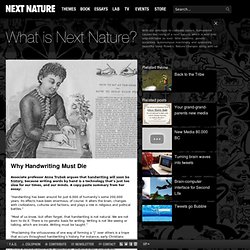
A copy-paste summary from her essay: “Handwriting has been around for just 6,000 of humanity’s some 200,000 years. Its effects have been enormous, of course: It alters the brain, changes with civilizations, cultures and factions, and plays a role in religious and political battles.” “Most of us know, but often forget, that handwriting is not natural. We are not born to do it. “Proclaiming the virtuousness of one way of forming a “j” over others is a trope that occurs throughout handwriting’s history. Academic publishers make Murdoch look like a socialist. Who are the most ruthless capitalists in the western world?
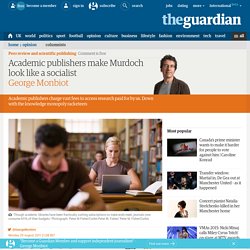
Whose monopolistic practices make Walmart look like a corner shop and Rupert Murdoch a socialist? You won't guess the answer in a month of Sundays. While there are plenty of candidates, my vote goes not to the banks, the oil companies or the health insurers, but – wait for it – to academic publishers. Theirs might sound like a fusty and insignificant sector. It is anything but. Revuesorg. FrontPage. Alliance <span>of</span> Digital Humanities Organizations. ScienceDirect - Home. Science 3.0. A space to explore, share and shape the issues facing social scientists. Academic reference management software for researchers.
Crossref.org. Ungluing ebooks. Uni: portable reading room for public space. Thèses. Project MUSE. Omeka. Library. Recensio.net. Interdisciplines. Google Scholar Citations. Citation metrics are often used to gauge the influence of scholarly articles and authors.
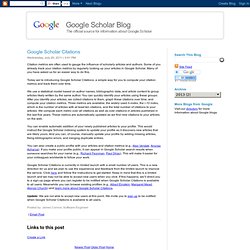
Some of you already track your citation metrics by regularly looking up your articles in Google Scholar. Many of you have asked us for an easier way to do this. Today we’re introducing Google Scholar Citations: a simple way for you to compute your citation metrics and track them over time. We use a statistical model based on author names, bibliographic data, and article content to group articles likely written by the same author.
You can quickly identify your articles using these groups. You can enable automatic addition of your newly published articles to your profile. You can also create a public profile with your articles and citation metrics (e.g., Alex Verstak, Anurag Acharya). Google Scholar Citations is currently in limited launch with a small number of users. Média social d'enseignement et de recherche. PLoS ONE : accelerating the publication of peer-reviewed science. Books are now in your hands. Web of Knowledge Service for UK Education - Home Page.
Open Access Week. HUB - Home. Index savant, le portail des revues scientifiques de la Francophonie - Index savant. ArXiv.org e-Print archive. Persée : Portail de revues en sciences humaines et sociales. Licence Edition Equitable : vers des archives ouvertes ? ? OWNI, News, Augmented. La Licence Édition Équitable pourrait bien être la solution à l'impasse dans laquelle se trouve l'édition numérique : dissocier les droits de l'auteur, de l'éditeur et du lecteur et adopter un modèle proche de l'Open Access.
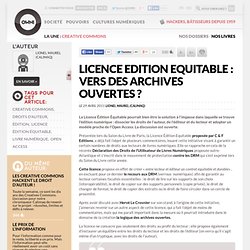
La discussion est ouverte. Non-conférence sur les Digital humanities (Paris, EHESS, 18 et 19 mai 2010) THATCamp: The Humanities And Technology Camp. Center for History and New Media. Online Digital Sources. CCSd - Centre pour la Communication Scientifique Directe. ??* *licence ?dition ?quitable : La licence. ISORE (SHS)?: Un r?seau th?matique de l?INSHS. ZONES. Le Bouillon des bibliobsédés. DHQ: Digital Humanities Quarterly: Fall 2010. Managing 100 Digital Humanities Projects: Digital Scholarship & Archiving in King’s Digital Lab James Smithies, King's College London; Carina Westling, King's College London; Anna-Maria Sichani, King's College London; Pam Mellen, King's College London; Arianna Ciula, King's College London Modelling Medieval Hands: Practical OCR for Caroline Minuscule Brandon W.
Reinventing Research? Information Practices in the Humanities. ISIDORE - Accès aux données et services numériques de SHS. Welcome to Open Library. Open Archives Initiative. Directory of open access journals.
Livre au centre, réseau du livre en région centre » Page » Page d’accueil. Le prix de la gratuité — Blogo-Numericus. Le Centre pour l’édition électronique ouverte, comme beaucoup d’autres, se bat pour refuser le terme « gratuit » et pour lui préférer le terme « libre accès », souvent utilisé dans sa forme anglaise, « Open access » ou « OA ». Pourquoi? Tout simplement parce que l’édition électronique en libre accès n’est pas gratuite. Il y a bien quelqu’un qui paie, quelque part. De l’édition électronique ouverte à OpenEdition — Blogo-Numericus. OpenEdition : portail de ressources électroniques en sciences humaines et sociales.
Visualizing what is happening. Going through an older post in the MoM’s blog referring to Walter’s Ong book “Orality and Literacy”, I discovered a term referring to a new “hybrid form” of culture that has spread on the internet: The Secondary Orality. The term is emphasizing the “re-emergence of an oral type of discourse within literate cultures which is fostering a communal sense and is mostly concentrated on the present moment”. In that sense, platforms of mediated communication, and in particular Twitter, are combining the narrative structure of oral discoursive forms that tend to highlight and enhance the memorability of a discourse, with certain characteristics and cognitive processes that evolved with the written discourse .
I found the term Secondary Orality an interesting source of inspiration when trying to understand and evaluate discussions on Twitter. Ce que le blog apporte à la science. Volumique. Hundreds of scientific Twitter friends. Calenda. Carnets de recherches en Sciences humaines et sociales. Cl?o - Centre pour l'?dition ?lectronique ouverte.